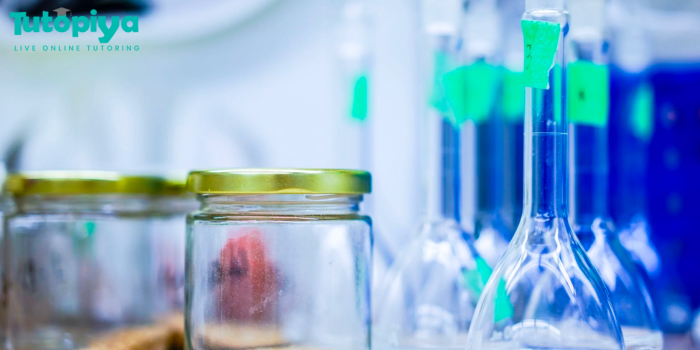Master IGCSE Chemistry
The internationally recognised IGCSE in Chemistry is a qualification that aims to give students a solid foundation in the subject. It is usually available to students between the ages of 14 and 16 and acts as an entry point for those who want to go on to study chemistry or related subjects in greater detail.
Benefits of Studying IGCSE Chemistry
Strong Foundation
A strong basis for additional study in chemistry-related subjects.
Critical Thinking
Improved capacity for critical analysis and problem-solving.
Practical Skills
Enhanced practical skills and scientific knowledge.
Global Recognition
Acceptance and acknowledgement on a global scale by colleges and employers.
IGCSE Chemistry Syllabus Breakdown
Recognising the curriculum is crucial for achieving success. To help you understand the main ideas of the IGCSE Chemistry syllabus, let's break it down.
Chemical Reactions
Experimental Techniques
Stoichiometry
The Particulate Nature of Matter
Electricity and Chemistry
Chemical Energetics
Atoms, Elements and Compounds
Organic Chemistry
Acids, Bases and Salts
The Periodic Table
Metals
Air and Water
Sulfur
Carbonates
Alternative to Practical

Key Topics and Their Importance
Periodic Table
Because it facilitates element classification, discloses structures in the properties of those classes of elements, and enables reactivity predictions, the periodic table is a crucial tool in chemistry.
Atomic Structure
Understanding the principles of the atomic framework is crucial because it clarifies the behavior of matter and the elements' arrangement in the periodic table.
Chemical Bonding
Chemical bonding is essential to chemistry given that it clarifies how compounds are formed, forecasts how atoms combine to form particles.
Chemical Reactions
Chemical reactions are the basic ideas of chemistry, providing us with an understanding of matter behavior and energy transformations.
Acids and Bases
PH regulation, ensuring safety in a range of applications, and resolving environmental issues all depend on an understanding of acids and bases.
Preparing for the IGCSE Chemistry Exam
Study Tips and Strategies
- Set up a study timetable: Schedule your study sessions so that you have enough time for each subject.
- Regular practice: Work through issues, carry out experiments, and routinely go over your notes.
- Ask for assistance when required: Never be afraid to seek help from your peers or teachers.
Recommended Study Resources
Use the IGCSE Chemistry study material, IGCSE chemistry revision notes, and IGCSE practice quiz to help you with your revision. These resources can aid in solidifying your comprehension of the topic.
Understanding Core and Extended Levels
Core Level
Appropriate for students seeking a fundamental comprehension of chemistry.
Extended Level
Intended for students who want to learn more about the subject in depth.
By choosing the right level, you can make the most of your abilities and achieve your academic and professional objectives.
Solving IGCSE Chemistry Past Papers
The Importance of Past Papers
- Makes you familiar with the format of the exam
- Assists in identifying your advantages and disadvantages
- Improves your ability to manage your time
Tips for Effective Use
- Set a timer: To simulate exam conditions
- Examine responses: Analyze your answers in detail
- Identify patterns: Determine typical question formats

Challenges and Common Mistakes
Difficult Concepts
Students often struggle with stoichiometry or organic chemistry, making it harder to understand the subject as a whole.
Chemical Equation Balancing
A frequent source of difficulty, resulting in inaccurate reaction and stoichiometry interpretations.
Time Management
Difficult to set aside enough time for practice, study, and revision with a large syllabus.
Tips for Avoiding Common Mistakes
Active Learning
Actively interact with material by doing experiments and practicing problems rather than passive reading.
Practice Balancing Equations
Devote time to mastering chemical equations as a fundamental skill supporting many chemistry facets.
Conceptual Understanding
Focus on understanding reasons behind reactions rather than memorizing facts. Make connections between concepts.
IGCSE Chemistry Exam Day
Last-minute Preparation
- Review main ideas: Key definitions, equations, and concepts before the test
- Complete past papers: Familiarize yourself with exam format and question types
- Stay organized: Ensure you have all supplies, ID, stationery, and allowed resources
Time Management Strategies
- Read instructions carefully: Understand paper format, question choices, and time allocation
- Organize time per section: Allocate time sensibly, focusing on confident areas
- Start with easiest: Begin with familiar questions to build confidence and score quickly
Useful Online Resources for IGCSE Chemistry
Tutopiya's Learning Platform
Offers tailored IGCSE chemistry notes, revision materials, past papers, quizzes, and qualified tutors. Book personalized tutoring sessions at your convenience for concentrated assistance.
IGCSE Chemistry for Homeschoolers
Comprehensive IGCSE chemistry syllabus, lesson notes, previous papers and quizzes available on Tutopiya's platform.
Future Pathways: Beyond IGCSE Chemistry
IGCSE Chemistry serves as a launching pad for further education and diverse career paths. It provides essential understanding and skills for academic success, preparing students for advanced chemistry studies.
Teacher and Parental Involvement
How Educators and Parents Can Support IGCSE Chemistry Students
Educators' Role
Should provide high-quality training that covers all subjects and provides clear explanations to assist students in building a thorough understanding of chemistry concepts.
Parents' Role
Play a key role in providing a good learning environment at home. Should provide a distraction-free learning environment and encourage a growth mindset by emphasizing effort and perseverance over inherent talent.
IGCSE Chemistry FAQs
How to study for IGCSE chemistry?
To prepare for the IGCSE Chemistry exam, make a well-organized study schedule, practice with previous exams, and ask teachers or use online resources for assistance when needed.
What are the benefits of taking Cambridge IGCSE chemistry?
Cambridge IGCSE chemistry provides a solid foundation, improves problem-solving abilities, and is widely accepted for options in postsecondary education and employment.
What are the passing grades for Cambridge IGCSE chemistry?
A*, A, B, C, D, E, F, and G are the grade levels in IGCSE Chemistry, with A* representing the highest possible grade and G being the lowest.
How long is the Cambridge IGCSE chemistry examination?
Paper 1 MCQ (45 minutes), paper 2 short answered and structured questions (1 hour and 15 minutes) and paper 3 practical test (1 hour).
How to prepare for IGCSE chemistry Examination?
To get ready, go over the syllabus in detail, practice with previous exams, and ask teachers or peers for assistance when necessary.
How do I get my Cambridge IGCSE chemistry results?
The dates and access to your results will be announced by your school or testing facility. You can view your results on the Cambridge Assessment website.
Ready to Excel in IGCSE Chemistry?
Get personalized tutoring and comprehensive study materials to ace your IGCSE Chemistry exams.
